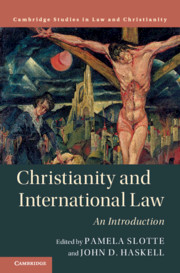Book contents
- Christianity and International Law
- Law and Christianity
- Christianity and International Law
- Copyright page
- Dedication
- Contents
- Tables
- Contributors
- Acknowledgments
- 1 Christianity and International Law: An Introduction
- 2 The Byzantine Commonwealth and the Emerging Features of a Law of Nations in the First Millennium
- 3 Christianity and the Birth of Ambassadorial Deontology: Some Historical Notes
- 4 Formation and Refiguration of the Canon Law on Trade with Infidels (c.1200–c.1600)
- 5 God, Sovereignty, and the Morality of Intervention outside Europe
- 6 The Significance of Christian Charity to International Law
- 7 Hugo Grotius: On Freedom of the Seas and Human Nature
- 8 Ius gentium et naturae: The Human Conscience and Early Modern International Law
- 9 Legalizing Antisemitism? The Legacy of Savigny’s Roman(tic) Law
- 10 Missionary Knowledge and the Empirical Foundations of Modern International Legal Thought
- 11 Standards for a Righteous and Civilized World: Religion and America’s Emergence as a Global Power
- 12 International Protestantism and Its Changing Religious Freedoms
- 13 Beyond the Freedom of Worship: The Contested Meaning of Religious Freedom in International Human Rights Law and Politics, 1945–1967
- 14 Process Theology and a Pluralistic Foundation for Human Rights
- 15 Christianity and Human Rights Law: Orthodox Perspectives
- 16 Conquest, Sacred Sites, and “Religion” in a Time of Crisis
- 17 Constantine’s Legacy: Preserving Empire While Undermining International Law
- 18 Hopelessly Practicing Law: Asylum Seekers, Advocates, and Hostile Jurisdictions
- 19 The Hidden Theology of International Legal Positivism
- Select Bibliography
- Index
- References
17 - Constantine’s Legacy: Preserving Empire While Undermining International Law
Published online by Cambridge University Press: 17 May 2021
- Christianity and International Law
- Law and Christianity
- Christianity and International Law
- Copyright page
- Dedication
- Contents
- Tables
- Contributors
- Acknowledgments
- 1 Christianity and International Law: An Introduction
- 2 The Byzantine Commonwealth and the Emerging Features of a Law of Nations in the First Millennium
- 3 Christianity and the Birth of Ambassadorial Deontology: Some Historical Notes
- 4 Formation and Refiguration of the Canon Law on Trade with Infidels (c.1200–c.1600)
- 5 God, Sovereignty, and the Morality of Intervention outside Europe
- 6 The Significance of Christian Charity to International Law
- 7 Hugo Grotius: On Freedom of the Seas and Human Nature
- 8 Ius gentium et naturae: The Human Conscience and Early Modern International Law
- 9 Legalizing Antisemitism? The Legacy of Savigny’s Roman(tic) Law
- 10 Missionary Knowledge and the Empirical Foundations of Modern International Legal Thought
- 11 Standards for a Righteous and Civilized World: Religion and America’s Emergence as a Global Power
- 12 International Protestantism and Its Changing Religious Freedoms
- 13 Beyond the Freedom of Worship: The Contested Meaning of Religious Freedom in International Human Rights Law and Politics, 1945–1967
- 14 Process Theology and a Pluralistic Foundation for Human Rights
- 15 Christianity and Human Rights Law: Orthodox Perspectives
- 16 Conquest, Sacred Sites, and “Religion” in a Time of Crisis
- 17 Constantine’s Legacy: Preserving Empire While Undermining International Law
- 18 Hopelessly Practicing Law: Asylum Seekers, Advocates, and Hostile Jurisdictions
- 19 The Hidden Theology of International Legal Positivism
- Select Bibliography
- Index
- References
Summary
Thou shall not return a refugee to persecution. Nation-states declared they had learned that critical lesson from the tragedy of the Holocaust by enacting international refugee conventions and protocols. Today, as refugees seek safety, they find fortress-like liberal democracies building walls of steel interlaced with legal strategies that undermine the international protections forged from the fires of the Holocaust. Consequently, refugees drown in the Mediterranean, die in the Mexico-United States desert, become detained in overcrowded refugee camps and unofficial street shelters, or become victims of criminal gangs. Nation-states have all too often abdicated their responsibility to refugees. This chapter explores this interlocking struggle between Christian hospitality toward the outsider and Christian refusal to offer that hospitality in support of national security. Christian beliefs that encourage submission to governing authorities and prioritize the nation undermine international law to the detriment of not just refugees but also citizens and the world community.
Keywords
- Type
- Chapter
- Information
- Christianity and International LawAn Introduction, pp. 366 - 394Publisher: Cambridge University PressPrint publication year: 2021

